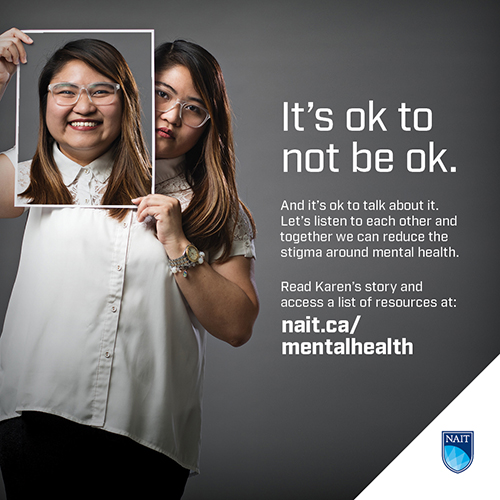February mental health campaign aims to promote conversations, reduce stigma
When Karen Velasco (Marketing ’18) uprooted her life in the Philippines to move halfway around the world to study at NAIT, she did so with her father’s blessing and a dream of a better life.
Leaving was still bittersweet because her father, Nardo, had been diagnosed with terminal cancer. A former captain in the military who in later life managed an insurance company, he was an active community leader who wanted the best for his children.
“He always told me when I was a kid that educating us was the only legacy he could leave us and our kids,” Velasco says.

The apple, it turns out, doesn’t fall far from the tree. Since arriving in Edmonton in 2016, Velasco, 29, has been a model student and citizen. Not only does she have one NAIT parchment under her belt, she’s working on a bachelor of business administration degree.
“I felt different. I wasn’t the same anymore.”
Outside class, she’s vice-president external with the students’ association, NAITSA. She’s a peer mentor to fellow international students, helping them adjust to life in Canada and the polytechnic (something she herself struggled with initially). She’s an outreach and well-being leader, or OWL, which is a group of student volunteers who promote wellness activities on campus, and is a member of the local chapter of mental health charity jack.org.
Through it all, she carries herself with a smile that’s infectious in its sincerity. But beneath the surface, there is at times a lingering sadness that, during her darkest days, threatened to upend her success.
The call that changed everything
During her second year, Velasco received the call that changed everything. Her sister, who chose to remain at home, delivered the news that their father had passed away. Velasco returned home for the funeral but, in her three weeks away, kept up with her assignments.
When she returned to Edmonton and resumed classes, something wasn’t right. Without her dad and their shared dream of celebrating convocation together, she wondered what she was doing with her life.
“I felt different. I wasn’t the same anymore,” she says.
The normally type-A student couldn’t sleep and became listless. A fellow peer mentor noticed something was off and literally dragged her to get help from NAIT’s Counselling Centre.
“They helped me learn to grieve,” she explains, “and told me it’s OK not to be OK.”
Help is available
If you or someone you know needs support, find a list of resources at nait.ca/mentalhealth.
Reducing the stigma
The latter point is the key takeaway behind a month-long mental health campaign at NAIT that Velasco is helping to promote. It’s the first such campaign in the polytechnic’s history, designed to reduce the stigma surrounding mental health, increase awareness and promote conversations.
“We really want to make sure that students and staff are aware of resources on or off-campus,” says Lynn Ryan, NAIT’s mental health coordinator who is overseeing the campaign.
The initiative launches as mental health awareness is growing through efforts like Bell Let’s Talk – and particularly the risks for post-secondary students. The 2016 National College Health Assessment survey of Alberta post-secondary students found that more than 90% of participants reported feeling overwhelmed and 13% seriously considered suicide.
In 2017, the province launched a mental health grant program for post-secondary institutions, setting aside $825,000 for NAIT (funding that helped create Ryan’s position and pay for the campaign, among other initiatives).
“I kind of lived a double life. I didn’t want to tell people I wasn’t OK.”
Ryan says post-secondary students are living through “massive transition” where many are on their own for the first time with new peer groups and responsibilities on top of full course loads. Social media, where people only share “snapshots of everyone’s perfect lives,” only adds to potential mental health challenges, she says.
“We’re less inclined to share how we’re actually feeling; less likely to talk.”
Putting on a happy face
Velasco can relate. When she was at her lowest, she wore the happy veneer of a model student. She didn’t share how she was feeling, how she shut down inside and stopped taking care of herself – to the point of almost failing a course.
“I kind of lived a double life,” she says. “I didn’t want to tell people I wasn’t OK.”
With support from counsellors and friends Velasco was able to open up, and those conversations helped her through her grieving. Every time she shares her story, it’s with the hope that it resonates with someone facing similar struggles in silence.
“It’s easier now for me to open up and tell friends, but I still have bad days – the days I’m not OK. And it’s alright.”